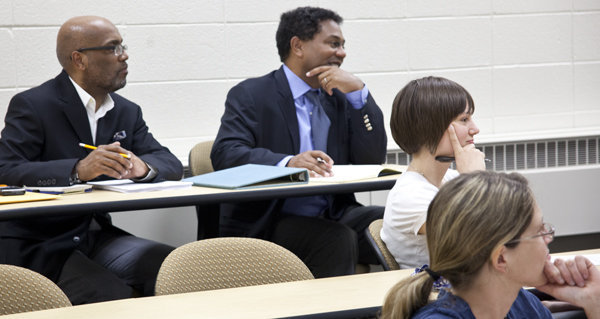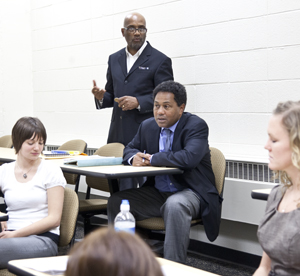
University of Wisconsin-Milwaukee social work graduate students recently had the ear of Earl Johnson, director of the Office of Family Assistance in the U.S. Department of Health and Human Services.
At the invitation of David Pate, assistant professor of social work, Johnson traveled from Washington, D.C., to listen to eight master’s and doctoral degree students from the Helen Bader School of Social Welfare (HBSSW) give end-of-the-year presentations on how policies affect children and families.
 “It was a pleasure to see the thoughtfulness and intellectual rigor that Professor Pate’s students gave to important social science issues. Based on their presentations and dialogue with the class, they seem well on their way to participating in the larger public-policy debates in their respective fields of interest. It was an honor to have had the opportunity to interact with such dynamic students,” said Johnson.
“It was a pleasure to see the thoughtfulness and intellectual rigor that Professor Pate’s students gave to important social science issues. Based on their presentations and dialogue with the class, they seem well on their way to participating in the larger public-policy debates in their respective fields of interest. It was an honor to have had the opportunity to interact with such dynamic students,” said Johnson.
Pate met Johnson in 1997 when Pate was a student at UW-Madison and hired by the university’s Institute for Research on Poverty (IRP) to conduct qualitative research. Johnson was well known for his qualitative research on black men, and IRP hired him to train Pate. “We’ve maintained a professional relationship and friendship since then,” said Pate.
As a teacher, Pate strives to keep his classes interesting and challenging to his students. “When Director Johnson was being considered for the position he has now, I mentioned to him that he should come and critique my students’ policy briefs as a service to the country.” Pate extended the invitation and the visit was approved.
For their final project, students individually chose the policy they wanted to discuss, but it had to be focused on alleviating poverty and analyzed in terms of how the policy affects people across race and gender.
“Primarily, the master’s students had to convince Director Johnson that they understood the policy, while the doctoral students had to suggest new policies. He looked at whether or not the students really had chosen a policy that was poverty-based, as well as why they chose that particular policy. In the case of the doctoral students, he also critiqued their suggestions and had them defend their research,” said Pate.
While Pate himself didn’t know that Johnson would be attending the presentations until very late in the semester, he was able to give the students a heads-up.
“The opportunity to present my policy paper to Earl Johnson was nerve-racking and exhilarating, but such a positive experience,” said Jayme Berggren, master’s student. “It gave me the confidence that one day I will be able to present in front of a larger committee to effect change. It was a great experience!”
Laura A. Voith, a doctoral student, described the chance to present her ideas on how to change policy as “a wonderfully rare opportunity. Dr. Johnson was knowledgeable, attentive, and he provided great feedback to each presenter. This opportunity moved learning from the classroom to the stage of the real world, preparing me for future policy work as a professional.”
Dani Skenandore, a master’s student, project assistant and peer adviser in the HBSSW, said, “Having the chance to present before Earl Johnson was a rare and unique opportunity that allowed me to advocate for much-needed policy development targeting the LGBT homeless youth epidemic in the United States.
“While I am very passionate and outspoken about LGBTQ rights in my community, I never imagined I would be able to potentially impact national policy. I walked away hoping that Earl Johnson will consider my arguments and recommendations in his future work for our country.”



